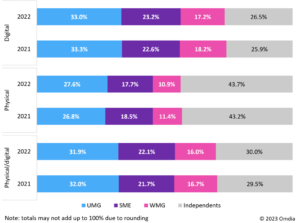 The latest issue of Music & Copyright is now available for subscribers to download. Here are some of the highlights.
The latest issue of Music & Copyright is now available for subscribers to download. Here are some of the highlights.
SPECIAL FOCUS: Stream-ripping continues to cast a dark shadow over the recorded-music sector
Despite music piracy and its poster child stream-ripping disappearing from headlines in the last few years, the practice of taking a music stream and converting it into a downloadable MP3 file is alive and well. In fact, figures show stream-ripping is thriving and is commonplace in all corners of the world, with user numbers for the most popular services rising faster than paid subscription numbers. Trade and industry groups have successfully limited access to some of the more prominent stream-ripping services, but the practice continues to grow. Advertising has long been the main source of revenue for stream-rippers. However, blue chip companies that indirectly supported the sites and services through their ad placements have tightened up their online presence, largely because of a sustained disruption and litigation campaign on the part of the global music industry.
NEWS FEATURE: Court rejects appeals against US CRB webcaster royalty rates
A Columbia Circuit appeals court has affirmed the royalty rates set by the US Copyright Royalty Board (CRB) in October 2021 for commercial subscription webcasters, commercial nonsubscription webcasters, and noncommercial webcasters. The rates, along with minimum fees payable by the webcasters, are applicable for the five years up to and including 2025. Broadcasting organizations the National Association of Broadcasters (NAB) and the National Religious Broadcasters Noncommercial Music License Committee (NRBNMLC) appealed the decision to double the minimum fees and rates payable by noncommercial webcasters, while performance rights organization SoundExchange complained that the rates set for commercial nonsubscription services should have been higher. However, at the end of July, the appeal court dismissed arguments from both sides and affirmed all of the CRB rate rises.
SECTOR ANALYSIS: Bad Bunny’s lucrative 2022 bodes well for the Latin music wave
It’s clear that Latin music has cut through internationally when a leading Chinese Mandopop artist records an album entirely in Spanish. It is arguably one of the hottest genres right now, and it remains on the up—last year, Latin recorded-music revenue broke through the $1bn mark in the US alone, and there’s certainly plenty more growth to come. Colombian artists such as Maluma and J Balvin initially led the charge, but Puerto Rico’s Bad Bunny is currently Latin’s poster child, seemingly able to rack up success upon success. Now it looks to be Mexican music’s turn in the limelight. Competition for artists and record companies is sharpening, however, and Latin music is set to become an increasingly expensive play.
COUNTRY REPORT: The Netherlands
In addition to the usual set of music industry statistics and news briefs, the latest issue of Music & Copyright includes a detailed Netherlands music industry report. After more than a decade of falling trade revenue from recorded-music sales, the Netherlands has experienced a sustained period of growth. In common with most developed markets in Europe, Dutch record company earnings were affected by online piracy as a result of the shift from physical formats to digital. However, for the last eight years, trade revenue has been on the up, and further growth is expected for this year and beyond. Digital accounted for more than 80% of the combined digital/physical trade revenue last year. UMG suffered a dip in its distributor share for the fourth consecutive year, with SME and WMG both making gains. However, UMG’s share remained double that of its closest rivals. Combined collections for the Dutch authors’ societies BUMA and STEMRA increased to a new record high, with both BUMA and STEMRA registering higher receipts. Producers’ and performers’ society SENA also saw license fees top the previous record. Live music bounced back after a forced 18-month shuttering as a result of the COVID-19 pandemic.
If you would like more information about the newsletter or to set up a subscription, then send us an email Alternatively, if you would like to download a sample copy, just go here.
- SEO Powered Content & PR Distribution. Get Amplified Today.
- PlatoData.Network Vertical Generative Ai. Empower Yourself. Access Here.
- PlatoAiStream. Web3 Intelligence. Knowledge Amplified. Access Here.
- PlatoESG. Carbon, CleanTech, Energy, Environment, Solar, Waste Management. Access Here.
- PlatoHealth. Biotech and Clinical Trials Intelligence. Access Here.
- Source: https://musicandcopyright.wordpress.com/2023/08/15/new-issue-of-music-copyright-with-netherlands-country-report-9/
- :has
- :is
- $1bn
- $UP
- 2021
- 2022
- 2025
- a
- Able
- About
- access
- accounted
- Ad
- addition
- Advertising
- affected
- After
- against
- Album
- alive
- All
- alone
- along
- also
- an
- analysis
- and
- appeal
- appeals
- applicable
- ARE
- arguably
- arguments
- artist
- Artists
- AS
- Association
- At
- available
- back
- Bad
- BE
- because
- become
- been
- Beyond
- Blue
- board
- border
- both
- Both Sides
- Broadcasting
- Broke
- but
- by
- Campaign
- certainly
- charge
- child
- chinese
- chip
- clear
- collections
- Columbia
- COM
- combined
- come
- commercial
- committee
- Common
- Companies
- company
- competition
- consecutive
- continues
- converting
- copyright
- corners
- country
- Court
- COVID-19
- COVID-19 pandemic
- Currently
- Cut
- Dark
- decade
- decision
- Despite
- detailed
- developed
- digital
- Dip
- disappearing
- Display
- Disruption
- distributor
- double
- download
- Dutch
- Earnings
- end
- entertain
- entirely
- Ether (ETH)
- Europe
- expected
- expensive
- experienced
- fact
- Falling
- faster
- Feature
- Fees
- few
- Figures
- File
- Files
- five
- Focus
- For
- Fourth
- from
- further
- Gains
- genres
- Global
- Go
- Group’s
- Grow
- Growth
- Have
- Headlines
- here
- High
- higher
- highlights
- hottest
- However
- HTTPS
- if
- in
- includes
- Including
- increased
- increasingly
- indirectly
- industry
- information
- initially
- internationally
- into
- issue
- IT
- ITS
- July
- just
- largely
- Last
- Last Year
- latest
- Latin
- leading
- Led
- License
- like
- limelight
- Limited
- limited access
- Litigation
- live
- Long
- LOOKS
- lucrative
- Main
- Making
- mark
- Markets
- max-width
- minimum
- more
- most
- Most Popular
- Music
- music industry
- NAB
- National
- Netherlands
- New
- news
- Newsletter
- None
- now
- numbers
- october
- of
- on
- ONE
- online
- or
- organization
- organizations
- over
- paid
- pandemic
- part
- performance
- period
- physical
- Piracy
- placements
- plato
- Plato Data Intelligence
- PlatoData
- Play
- Plenty
- Popular
- poster
- practice
- presence
- previous
- prominent
- Puerto
- Rate
- Rates
- receipts
- record
- records
- registering
- remained
- remains
- report
- result
- revenue
- right
- rights
- Rises
- rising
- rivals
- royalty
- sales
- saw
- send
- Services
- set
- Shadow
- Share
- sharpening
- shift
- should
- show
- Sides
- Simon
- Sites
- SME
- Society
- some
- Source
- Spanish
- statistics
- stream
- subscribers
- subscription
- success
- Successfully
- such
- Supported
- sustained
- taking
- than
- that
- The
- the Netherlands
- the world
- their
- then
- this
- this year
- thriving
- Through
- tightened
- to
- top
- trade
- TURN
- upon
- us
- User
- usual
- WELL
- were
- when
- while
- with
- WordPress
- world
- would
- year
- years
- you
- zephyrnet












